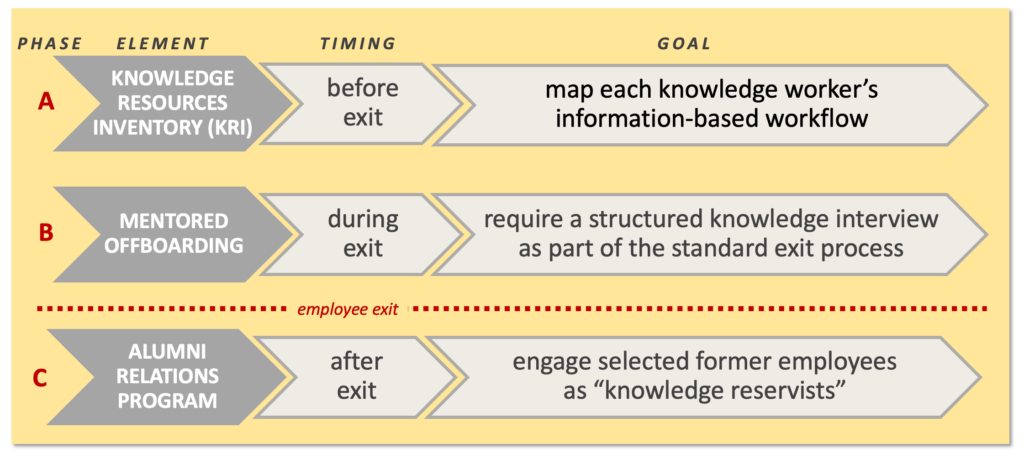
Knowledge Strategy, Organization and Management
Knowledge Erosion: How to Avoid It
I encourage knowledge professionals to continually engage — as directly as possible — with the most pressing strategic challenges facing their client organizations. And I rarely give advice I don’t follow myself. So when I was recently invited by Fisher Yu and his team at MentoringCo to address the issue of the erosion of tacit knowledge, I gratefully accepted the challenge. Here’s a summary of my findings…
The war for talent continues
The war for talent has now reached down into the ranks of major organizations. In the US, there are currently two open jobs for each job seeker — an all-time high. A 2022 survey by The Conference Board of global CEOs found their top concern the same in all geographies worldwide — attracting and retaining talent. And the accelerating retirement of boomers and older GenXers — coupled with the post-pandemic great resignation, as workers try to find greater purpose in their lives — just accelerates this.
Knowledge is human
Knowledge is human. Knowledge is exclusively human — it does not exist independent of people. When it’s transferred by first being converted into codified or documented form, it is then Information.
So when people leave the organization, as they do for a host of reasons, their knowledge leaves with them. The cost of replacing that lost knowledge is huge — and even moderately successful efforts to retain and transfer knowledge may therefore produce substantial returns.
A three-phased solution
Benefitting from knowledge after the knowledge leaves — is there a solution for this apparent paradox? While this may not be a “solution” that cures the problem, I’ve proposed an approach to manage the problem that would benefit many organizations. This has three phases executed sequentially — before the employee exit (Phase A), during the exit process (Phase B), and following exit (Phase C).
This diagram summarizes the phases:
Phase A — Knowledge Resource Inventory (KRI)
In the course of everyday workflow, each knowledge worker creates a unique “footprint” that profiles his/her use of information resources. This includes things like information used most often, meetings attended regularly, projects and teams work on, reports produced, standard procedures for frequent tasks, contact lists, and community and network membership. This can be captured into a formal KRI record that describes this footprint for each employee. It can be captured through a mix of surveys, personal interview(s), and/or technology usage monitoring.
Note that the personal KRI should be created and maintained on an ongoing basis, not just when an employee is leaving. When used in the aggregate across employees, I’ve found it useful for other ongoing purposes such as harmonizing technology use across individuals and teams.
Phase B — Mentored Offboarding
When knowledge workers are onboarded, they are typically exposed to information resources that will be used in executing their jobs. This process is simply reversed during offboarding — a brain dump that ideally occurs within 60-90 days of their leaving. This phase is most effective when done as a personalized coaching or mentoring effort — that is, where there is extended personal guidance though the information resources used on the job.
Phase C — Alumni Fellows Program
While the first two phases prepare in advance for the loss of employee knowledge, the key to knowledge efficacy is having the living knowledge available when it is most needed to solve problems.
Even organizations that keep track carefully of their knowledge resources often make the mistake of thinking of their knowledge perimeter as ending where their workforce ends. While this may at one time have largely been the case, such perimeters are now better seen as porous — and can extend to outside parties such as customers, suppliers, analysts, and academics.
And to company alumni — often the single most overlooked of these potential resources. Keeping alumni engaged after exit is arguably the best way to keep their knowledge on tap. This can be achieved as an “Alumni Fellows” Program that keeps retirees available for consultations to current employees. While a modest honorarium may be needed to coax the best and brightest, sometimes the recognition alone and/or some symbolic perks (an occasional dinner, for example) may suffice.
Update — fall 2023
Knowledge erosion is not just a scary trend dreamed up by hungry consultants. It’s real and has real impacts on outcomes — the performance and product quality of major firms and industries. The Wall Street Journal reports, for example, that in the accounting profession, more people are leaving through retirements and lack of interest than are coming in through training. This gradual but persistent net outflux of talent erodes even a highly-codified body of knowledge such as accounting — whose principles and practices require continually-refreshed human stewardship to be sustainable. The result? An erosion of the quality of the assurances provided by the industry, as reflected in various metrics like the number of restatements if financial results and the industry’s peer oversight performance ratings.
When people leave an organization for any reason, their knowledge capital leaves with them. This knowledge erosion has negative financial impacts — it significantly increases the cost of training new people to take over, and in the meantime can damage product quality and enterprise performance. Organizations must create a knowledge strategy that formally addresses and mitigates this unavoidable problem before, during, and after it occurs.
Hi Tim
I am knoco caribbean. About to join the global km family.
Exploring km frameworks for design, development, implementation, auditing and certification